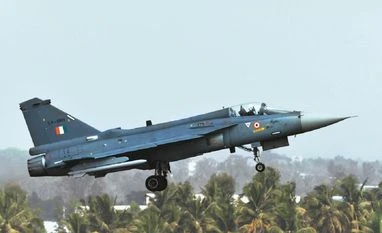Tejas fighter completes 7 years of service in the Indian Air Force
The IAF's confidence in the Tejas is underlined by the latest order for 83 Mark-1A fighters
)
Listen to This Article
India’s home-grown Light Combat Aircraft (LCA) completed seven years of service in the Indian Air Force (IAF) on Friday.
Christened Tejas in 2003 by former prime minister Atal Behari Vajpayee, the fighter aircraft is a multi-role platform that is steadily making a name as one of the world’s premier light fighters.
Designed by the Defence Research & Development Organisation (DRDO), the multi-role Tejas fighter can perform the roles of air defence, maritime reconnaissance and strike, switching between roles with the press of a button.
Tejas is built to be an inherently unstable fighter, with a sophisticated quadruplex flight control system. This allows the pilot carefree handling and enhanced manoeuvrability.
This multi-role capability is further enhanced by the Tejas’ multi-mode airborne radar, helmet-mounted display system, a self-protection suite and a laser designation pod.
Also Read
The first 20 Tejas Mark 1 fighters formed the IAF’s Number 45 Squadron -- the “Flying Daggers.” Over the years, 45 Squadron has flown Vampires, Gnats and then the MiG-21 BIS, before being equipped with the Tejas Mark 1.
All the aircraft flown by the Flying Daggers have been manufactured in India -- first under licensed production and then, like the Tejas, designed and developed in India as well.
In May 2020, No 18 Squadron became the second IAF unit to operate the Tejas – still in its Mark 1 variant. [The IAF followed up those 40 fighters with another order for 83 more in a more advanced varient called the Mark 1A.
The IAF’s confidence in the Tejas is underlined by the latest order for 83 Mark-1A fighters. These will have updated avionics, an active electronically steered radar, an updated electronic warfare suite and a beyond visual range missile capability.
The new LCA variant will be capable of firing a range of weapons, missiles and cannon-fire from increased stand-off ranges. The Tejas LCA Mark 1A will see a substantial increase in the overall indigenous content of the aircraft.
Contracted deliveries of the aircraft are expected to commence in February 2024. In the years to come, the LCA and its future variants will form an important mainstay of the IAF.
The IAF has showcased the DRDO’s indigenous aerospace design, development and production capabilities by displaying the aircraft at various international air displays.
These include the Langkawi International Maritime and Aerospace Aerospace in Malaysia, Dubai Air Show-2021, Sri Lanka Air Force anniversary celebrations in 2021, Singapore Air Show- 2022 and Aero India Shows from 2017 to 2023.
After participating in numerous exercises in the Indian skies with foreign air forces, Tejas made its debut abroad in March 2023 in Exercise Desert Flag in the United Arab Emirates (UAE).
Meanwhile, the China/Pakistani JF-17 Thunder was being developed as a cheap, lightweight fighter for the Pakistan Air Force (PAF). More than 100 JF-17 Thunder jets have been inducted into service with the PAF since 2007.
| - |
JF-17 Thunder
|
Tejas Light Combat Aircraft
|
|
First flight
| August 25, 2003 | January 4, 2001 |
| Entry into service | March 12, 2007 | January 17, 2015 |
| Numbers in service | Over 100 | 40, with 83 more on order |
| Engine Type | Klimov RD-93 Turbofan | GE F-404 turbofan |
| Range | 3,482 km | 3,000 km |
| Top speed | 1,910 km/hour | 2,205 km/hour |
| Empty weight | 9,000 kg | 6,500 kg |
| Max take-off weight | 13,500 kg | 13,500 kg |
| Payload | 4,500 kg | 5,300 kg |
| Fuel capacity | 5,400 litres | 6,400 litres |
| Combat range | 1,200 km | 1,500 km |
| Rate of climb |
300 metres/second
| - |
|
Armament carriage
|
1 x 23 mm Gasha cannon |
8 x hard points for free-fall bombs, missiles, rockets
1 x 23 mm Gasha cannon
9 x hard points for free-fall bombs, missiles, rockets
More From This Section
Topics : Tejas fighter Tejas fighter jets Tejas LCA-Tejas
Don't miss the most important news and views of the day. Get them on our Telegram channel
First Published: Jun 30 2023 | 9:21 PM IST


